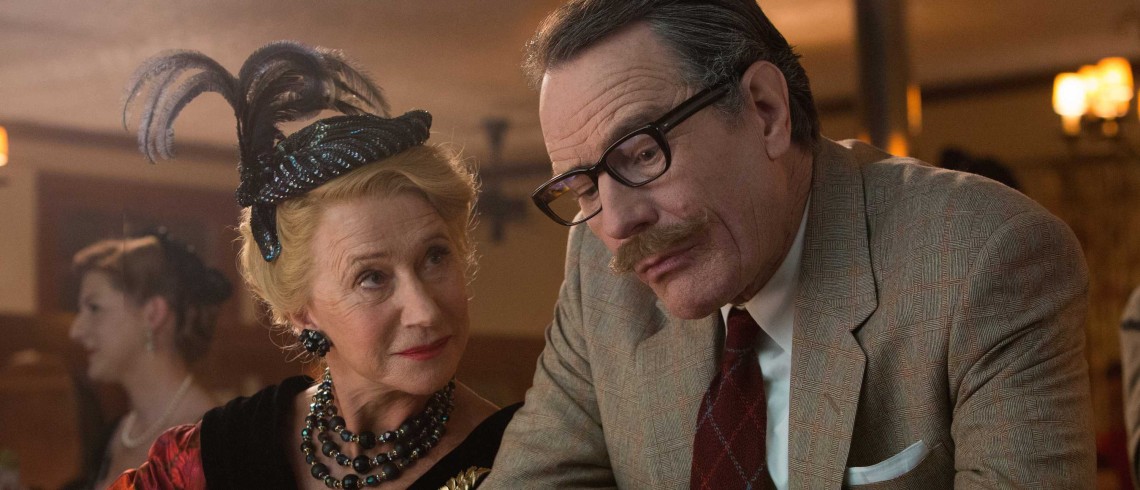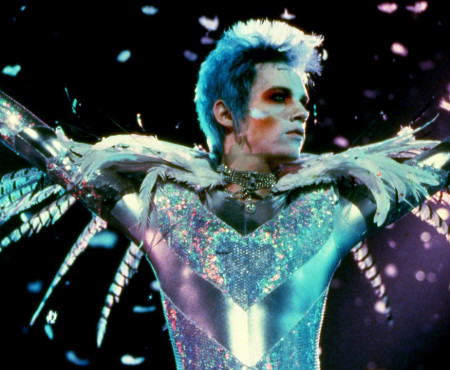In a screenwriting career that spanned three decades, the man born James Dalton Trumbo did a little of everything. He penned feather-light romances like Roman Holiday, sweeping war pictures such as Thirty Seconds Over Tokyo, a swords-and-sandals epic in Spartacus, and even low-grade schlock in the vein of The Green-Eyed Blonde. He’d try his hand at anything, partially because he liked a challenge and later on because he needed the money, but one thing is certain: Dalton Trumbo would’ve never written something like Trumbo.
Trumbo would’ve bristled at the overbearing obviousness of the biopic that bears his name, would’ve cringed at its simplicity of character and thinness of ideas (though director Jay Roach’s characterization of the man would have us believe that he’d have been all too pleased with the film’s relentless repeated declarations of his apparent genius). A master of social import through earnestness and subtlety, Trumbo would’ve buried his head in his hands when seeing a shot of himself sitting forlornly beneath an American flag after being denied his beliefs by the courts. Trumbo, more plain than it is egregious, is still yet another in a long line of biopics unworthy of their extraordinary subjects. In attempting to capture the essence of a man rich in wit, intelligence, conviction, and compassion, the film can’t muster up any of the same virtues.
Roach starts by biting off more than he can chew, widening his focus to cover the 13-year battle between Trumbo (Bryan Cranston), the unashamed Communist, and the Cold War witch hunters eager to see him strung up as an example. The year is 1947, and anti-Soviet sentiments have turned Hollywood into a town full of gumshoes ferreting out pinko sympathizers. The House Un-American Activities Committee summons Trumbo so he can ’fess up and name names, providing Roach and screenwriter John McNamara with the sort of courage-in-the-face-of-adversity scenario that awards-hungry studios salivate over. With a gossip-mongering columnist (Helen Mirren) and furious studio heads breathing down his neck, Trumbo has to figure out how to keep his family afloat fiscally while clearing his own name and the names of his fellow Communist-party members. In 2015, the film’s anti-McCarthyism stance is somewhat less than bold, but Roach wants to make damn sure everyone knows that it was fearless at the time.
Working in the dignified-stateliness mode he assumed for HBO political dramas Recount and Game Change, Roach shoehorns every tortured-genius cliché he can think of into this two-hour museum exhibit. Trumbo’s snow-pure child (Elle Fanning, making a compelling case against her continued presence at the movies with her cloying cute-kid tropes) rights his moral compass when pressures begin to lead him into the self-destruction of writerly brown liquor and amphetamine pills. Liberal shakings of talcum powder gradually creep into Cranston’s hair as scenes jump forward two, three, five years at a time, though the makeup department mercifully refrains from any facial prosthetics. An early cough signals certain doom for a friend (unnamed here for spoiler’s sake), whose death serves only to motivate our hero and add another tragic dimension to his plight. There’s even a purely fictitious Magical Black Man who makes Trumbo’s acquaintance during his stint in prison and imparts a valuable life lesson upon the writer, then vanishes completely. Worse than all the clichés, though, is how badly it overreaches: As laudable as Roach’s attempt to cover the whole of Trumbo’s orbit is, there’s no need to cram in his daughter’s nascent civil-rights passion, a pal’s cancer, and a hideous John Wayne doppelgänger when his own struggle through jail, financial insolvency and social ostracization is compelling enough.
John Goodman makes for a fine side show as the Z-movie producer who takes Trumbo in when the major studios shun him. But Cranston’s performance is, naturally, the main attraction here. He takes clear pleasure in the principled writer’s sassy erudition, and ever since he broke bad, his ability to sell an emotionally intense monologue for all it’s worth has been public knowledge. Cranston delicately balances several scales, weighing Trumbo’s self-importance against his sense of public duty, his passion for writing against his practical need for money, his selflessness against his vanity. Aside from Roach’s recreating the classic photo of Trumbo writing in the bathtub, Cranston’s not especially burdened with the responsibility of impression. His performance is simply powerful and powerfully simple, unadorned with the showy accents or physical transformations that weigh down so many biopics.
Trumbo could’ve been far more grating than it is, but praise that measured speaks to the steadily sinking expectations audiences hold for biopics rather than this film in particular. The film’s Hollywood hustle and bustle makes for sporadically diverting fun, but this paint-by-numbers biopic has already been made a dozen times over. Despite its noble mission, Trumbo still plays like a cover song that succeeds only in making the audience pine for the real deal.




















